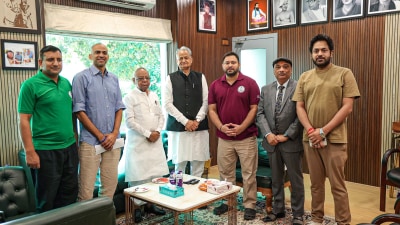Heatstroke sends Shah Rukh Khan to hospital: How heat affects the body, how to stay safe
Heatstrokes can be very dangerous — even deadly — if not treated immediately. Here is all you need to know about them.
 Shah Rukh Khan waves at the crowd as he celebrates KKR's win in the Qualifier 1 of IPL 2024 at the Narendra Modi Stadium, in Ahmedabad, on Tuesday. (PTI photo)
Shah Rukh Khan waves at the crowd as he celebrates KKR's win in the Qualifier 1 of IPL 2024 at the Narendra Modi Stadium, in Ahmedabad, on Tuesday. (PTI photo)Shah Rukh Khan has been admitted to a hospital in Ahmedabad after suffering a heatstroke on Tuesday (May 22), news agency PTI reported. He fell ill after attending last night’s IPL game between his team Kolkata Knight Riders, and the Sunrisers Hyderabad, which saw KKR emerging victorious and booking a berth in Sunday’s IPL final.
Here is how heat affects the human body, and how to prevent heat strokes during hot Indian summers.
What is a heat stroke?
A heat stroke happens when the ambient temperature is so high that the body is unable to sweat to regulate the core temperature, which shoots up to 40 degree Celsius. In such cases, there is a severe imbalance of salts such as sodium and potassium in the body. The high core temperature coupled with salt imbalances disrupts organs, leading to a host of symptoms.
“It can affect the brain, making a person foggy, drowsy, and in severe cases may also lead to a person going into a coma. It can lead to kidney and liver damage as well. A cascade of such symptoms leads to death due to heat stroke,” according to Dr Suranjit Chatterjee, senior consultant of internal medicine at Indraprastha Apollo Hospital, New Delhi.
He added that in such severe cases, the aim is to bring down the core temperature of the body fast. This can be done by pouring cold water over the person, making them drink cold drinks, and giving them electrolytes to balance salt levels.
When should you rush to a hospital?
Dr Chatterjee said a person should be taken to a hospital immediately if they are exhibiting these symptoms: their body temperature is very high but they are not sweating at all, they are feeling drowsy, they are vomiting, they are not passing urine, and they are not breathing properly.
Special care should be given to those who are old and very young and those who have comorbidities as they are more prone to the impacts of heat. “However, this does not mean that young people cannot get heat stroke, it can happen at any age,” said Dr Chatterjee.
What to do to prevent a heat stroke?
To prevent heat stroke, it is better to avoid stepping out in direct sunlight, especially between noon and 3 pm. You should avoid strenuous activity during this time.
If you have to step out, ensure you keep drinking water even if you do not feel thirsty. Drink other hydrating fluids like lassi, lemon water, buttermilk or ORS that can maintain electrolyte levels. Do not consume alcohol, tea, coffee, and carbonated soft drinks as they can dehydrate you further. Wear lightweight, light-coloured, loose, and porous cotton clothes and use goggles, umbrellas, and shoes.
A 2023 advisory by the National Disaster Management Authority says that people should try to keep their homes cool by using curtains or shades, and to keep body temperature low by using a damp cloth or taking cold baths frequently.
Why are humidity, night-time temperatures important?
Dr Dileep Mavlankar, former director of the Indian Institute of Public Health, Gandhinagar, told The Indian Express last year that when the humidity levels are high, perceived temperatures are higher than the actual reading for ambient temperature. High humidity levels also mean that sweat does not evaporate effectively to keep the body cool.
“If night temperatures also remain high, the body doesn’t get time to rest. Suppose you step out when it is 44 degree Celsius, if you come back indoors to a cooler place in a few hours, you feel relief. The body finds this relief when the night temperatures are low. If the temperatures are not low even at night for a couple of days, the body cannot recoup,” Dr Mavalankar said.
This is an updated version of an explainer first published in 2023.





- 01
- 02
- 03
- 04
- 05

































